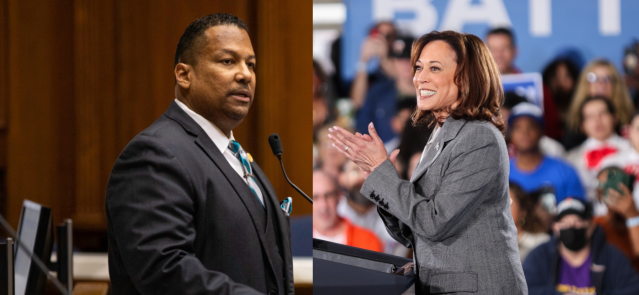Stay ahead of the curve as a political insider with deep policy analysis, daily briefings and policy-shaping tools.
Request a DemoFamily and Social Services proposes ending attendant care payments to parents, spouses to cover nearly $1B shortfall

The Indiana Statehouse dome in 2023. (Credit: Mark Curry)
The Indiana Family and Social Services Administration has proposed “sustainability strategies” to mitigate a nearly $1 billion forecasting error it made last year. But critics argue the administration’s proposals would burden Hoosier families who rely on some Medicaid services by reducing caregivers’ pay.
Last month, Family and Social Services Administration leaders told the State Budget Committee that the administration had underestimated the cost of covering Hoosiers’ Medicaid services over the biennium by $984.3 million. Lawmakers plan to cover the loss by using monies from the state surplus and a state Medicaid reserve account.
After additional data analysis, the administration determined the state’s Aged & Disabled waiver program “is where the Medicaid program is most acutely seeing an unanticipated growth in spending,” it said in a Jan. 17 announcement.
“Overall, attendant care expenditures on the A&D waiver have grown from approximately $30 million per month in April 2022 to approximately $120 million in December 2023, which is a 300% increase in a little more than a year and a half and have nearly quintupled since July 2020,” Michele Holtkamp, an administration spokesperson, said in an email to State Affairs.
Through the waiver program, spouses or parents of minor children — termed legally responsible individuals — are paid an hourly rate to care for their aging or disabled spouse or child at home. The program serves as an alternative to nursing facilities. In December, 41,157 Hoosiers received services through the waiver, Holtkamp said.
Under the administration’s proposal, Aged & Disabled waiver recipients currently providing attendant care for their disabled children or spouses will be transitioned to Indiana’s Structured Family Caregiving program by July 1. The caregiving program, however, would pay spouses and parents a daily rate, based on the dependents’ need, that is substantially less than what attendant care providers receive, said Karly Sciortino-Poulter, The Arc of Indiana’s advocacy network director.
Yesterday, dozens gathered to protest the administration’s proposals, and more than 12,000 people have signed a petition to continue allowing parents and spouses to provide attendant care through the Aged & Disabled waiver program.
“The payment to family caregivers is what is taking the most attention immediately because that is the one that will be felt most immediately by individuals and families,” Sciortino-Poulter said. “We recognize that the proposals being made will have a huge impact on families and individuals, and will have a negative impact on families. And this is coming off the heels of the state reassuring families in May that these programs were going to continue.”
The caregivers are paid by Medicaid approved waiver agencies, so the administration does not collect individual caregivers’ pay, Holtkamp said, making the exact pay discrepancy between the two programs uncertain.
Come July 1, dependent Hoosiers could still receive attendant care from a professional, just not from a spouse or parent.
On Jan. 17, the administration also made immediate changes to the waiver program, prohibiting any new waiver recipients from providing attendant care — often assistance with basic life functions — for dependent family members.
In addition, spouses or parents of minor children can now no longer be paid to provide home and community assistance services, which are often “less intimate” than attendant care, such as helping a dependent family member drive to the bank or go grocery shopping, Sciortino-Poulter said. Families can currently only provide either attendant care or home and community assistance services, she said.
Over the next several months, the administration has outlined plans to make myriad changes to Indiana’s Medicaid programs to save an estimated $300 million annually, including temporarily pausing a 2% rate indexing across Medicaid services and restricting retroactive waiver coverage.
Implementing many of the Family and Social Services Administration’s proposals requires the agency to issue new draft waivers, which are out for public comment. A second round of public comment began Jan. 17 for the state’s Aged & Disabled, PathWays, Traumatic Brain Injury, Community Integration and Habilitation and Health & Wellness waivers. The draft waivers open for public comment will be submitted to the Centers for Medicare & Medicaid Services for approval. The public comment period is open through Feb. 16. The effective date for the waivers is July 1.
The Aged & Disabled waiver will be split into two new waivers — a PathWays waiver (for ages 60 and older) and a Health & Wellness waiver (for ages 59 and younger) — by July 1 as Indiana rolls out its upcoming Indiana PathWays for Aging program.
On Jan. 18, Indiana Medicaid Director Cora Steinmetz told the Community and Home Options to Institutional Care for the Elderly and Disabled Board that the waiver program accounted for about half of the “unanticipated variance” reported in December.
Reduced pharmacy rebates, the delayed implementation of the state’s applied behavioral analysis therapy rate fee schedule (to Jan. 1, 2024, from July 1, 2023) and a lesser federal medical assistance percentage also contributed to the shortfall, Steinmetz said.
“We understand that families are concerned, specifically about a disruption to the model that allowed parents of minors or spouses (legally responsible individuals) of A&D waiver members to be paid as attendant care providers for their loved ones,” the administration wrote on its website. “FSSA had previously offered a means for legally responsible individuals to support the direct personal care needs of recipients. However, we must now move to a service model that aligns with allowable waiver practices, is more financially sustainable, and also better recognizes support needs of caregivers.”
Contact Jarred Meeks on X @jarredsmeeks or email him at [email protected].
X @StateAffairsIN
Facebook @stateaffairsin
Instagram @stateaffairsin
LinkedIn @stateaffairspro
4 things to know about Braun’s property tax proposal
Sen. Mike Braun, the Republican candidate for Indiana’s governor, released a plan for overhauling property taxes Friday morning that would impact millions of Hoosiers, Indiana schools and local governments. “Nothing is more important than ensuring Hoosiers can afford to live in their homes without being overburdened by rising property taxes driven by rapid inflation in …
Bureau of Motor Vehicles looks to add new rules to Indiana’s driving test
The Bureau of Motor Vehicles wants to amend Indiana’s driving skills test, putting “existing practice” into administrative rule. Indiana already fails drivers who speed, disobey traffic signals and don’t wear a seatbelt, among other violations. Yet the BMV is looking to make the state’s driving skills test more stringent. A proposed rule amendment looks to …
In Indianapolis, Harris says she’s fighting for America’s future
Vice President Kamala Harris, the presumptive Democratic presidential nominee, told a gathering of women of color in Indianapolis on Wednesday that she is fighting for America’s future. She contrasted her vision with another — one she said is “focused on the past.” “Across our nation, we are witnessing a full-on assault on hard-fought, hard-won freedoms …
Indiana Black Legislative Caucus endorses Harris, pledges future support
The Indiana Black Legislative Caucus unanimously voted Wednesday to endorse Vice President Kamala Harris’ presidential run and will look at ways to assist her candidacy, the caucus chair, state Rep. Earl Harris Jr., D-East Chicago, told State Affairs. The caucus is made up of 14 members of the Indiana General Assembly, all of whom are …




